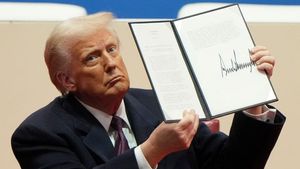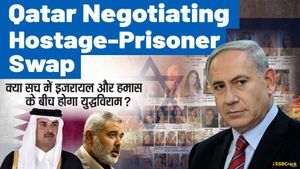Violence has surged dramatically in the eastern Democratic Republic of Congo (DRC) over the past week, marking the latest episode of conflict involving the M23 rebel group. The situation escalated significantly when M23 launched major offensives against Congolese forces, culminating in the capture of Goma, the region's largest city. This latest chapter has resulted not only in significant military casualties but has also incited a severe humanitarian crisis affecting thousands of civilians.
According to reports, at least 700 people have lost their lives, and around 2,800 have been injured due to intense fighting from january 26 to 30 alone. The UN Secretary-General spokesperson, Stéphane Dujarric, confirmed these alarming numbers, stating, "At least 700 people have been killed and 2,800 injured." The violence has overwhelmed local hospitals and morgues, leading to desperate conditions for the injured and deceased. The Congolese Health Ministry reported on January 30, 2023, there were 773 bodies already in morgues, with some still lying on the streets due to overcrowding.
The M23 group's advances have drawn international scrutiny and condemnation. Reports indicate the rebels, allegedly backed by Rwanda, are also asserting control over mineral-rich areas, raising tensions not only with the Congolese government but also with the international community. Echoing this discontent, the Congolese Foreign Minister, Thérèse Kayikwamba Wagner, has publicly called for Arsenal, Bayern Munich, and Paris St-Germain to terminate their sponsorship deals with Visit Rwanda, criticizing Rwanda's role amid the conflict. She articulated, "It is time Arsenal ended its blood-stained sponsorship deals with this oppressor nation." This push against sponsorship highlights the growing global awareness of the humanitarian impacts of the conflict.
The dire humanitarian situation has seen over 400,000 people forced to flee their homes this year alone. Refugees have streamed across borders to neighboring Rwanda, exacerbated by the chaos on the ground. Humanitarian organizations report massive looting of warehouses and NGOs' offices, reflecting the total collapse of order in many locales. Local hospitals overwhelmed with casualties attempt to provide care, but the effects of fighting have stretched resources thin.
Analyzing the roots of the conflict, the M23 group originally emerged from discontent among Rwanda-backed ethnic Tutsis, who claimed their rights and interests were being sidelined by the Congolese government. Despite their ethnic roots, the group's leadership has reportedly begun to showcase itself as representing broader Congolese nationalism. Corneille Nangaa, once the head of Congo's electoral commission, is asserting control over the group, distancing M23's identity from solely ethnic lines. Despite international perceptions of M23 as just another insurgent force backed by external actors, Nangaa’s rebranding aims to portray the group as allies of Congolese citizens seeking genuine representation.
While Rwanda has consistently denied any military involvement, stating through its foreign ministry, "The [Rwandan Defense Forces] defends Rwanda's borders from threats and protects civilians, it does not attack civilians," the allegations persist. The UN and experts assert there are approximately 4,000 Rwandan troops backing M23 operations, indicating complex regional dynamics at play.
United Nations personnel and peacekeepers are also under fire amid this violence. Recent reports confirmed the tragic deaths of Tanzanian soldiers involved with peacekeeping missions, raising the death toll among peacekeepers to at least 20. The Tanzanian People's Defense Force confirmed the losses of two of its soldiers, injured during the M23 skirmishes. With thousands displaced and cities like Goma under siege, the semi-chaotic environment has made it challenging even for humanitarian groups trying to intervene.
Despite the grim outlook, the Congolese government stands firm. Congolese President Félix Tshisekedi has promised "a rigorous and coordinated response" to the M23 threat, promising not to surrender control easily over the volatile east. The government continues to rally resources and manpower to reclaim the territory lost to M23, amid complex relations with regional neighbors and international stakeholders.
International observers and analysts fear the conflict may escalate even more as various factions vie for power and control over valuable minerals. With the DRC housing vast natural resources, the stakes are ever high. Many armed groups have their eyes set on exploiting this wealth, often at the expense of civilian lives and stability. The M23 coalition's recent maneuvers signify not only a quest for rights but showcase the deep political grievances and resource-driven conflicts threatening the entire region.
Conclusively, with Goma and much of eastern Congolese territory under significant duress, the outlook for the region remains tenuous. The combination of heavy casualties, widespread humanitarian suffering, and local grievances rooted in historical conflict suggests a long and challenging road lies ahead for peace and recovery. Without concerted international support and regional cooperation, the people of eastern Congo remain at the mercy of repeating cycles of violence.



